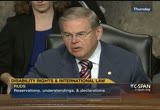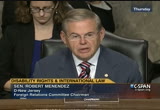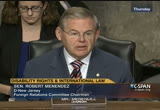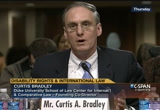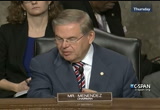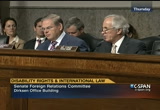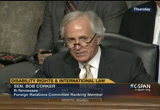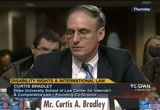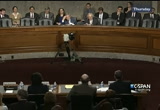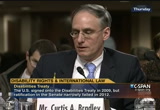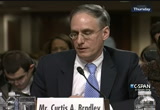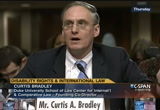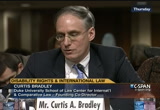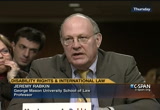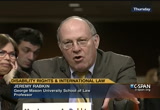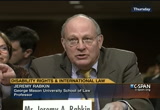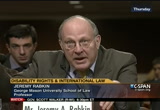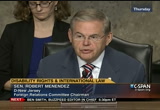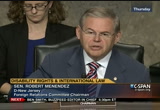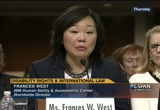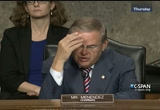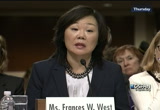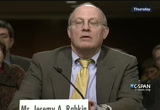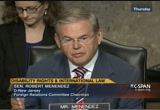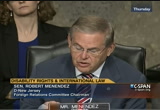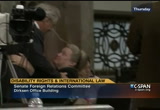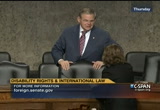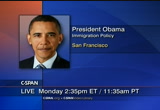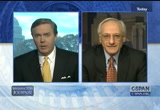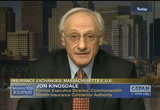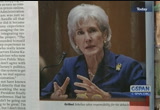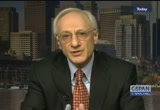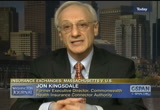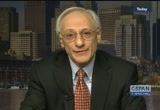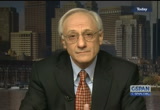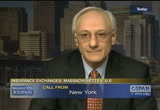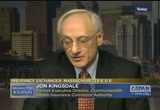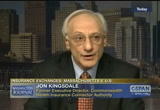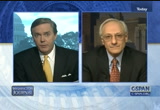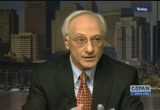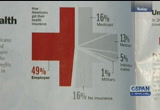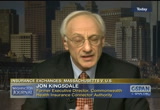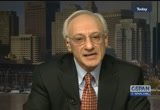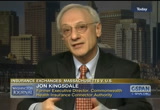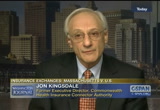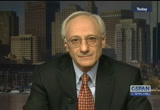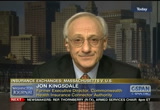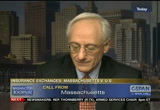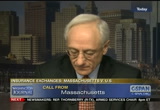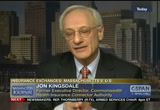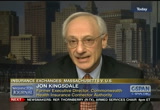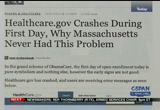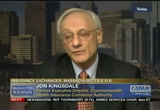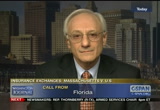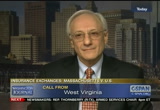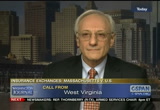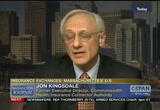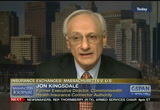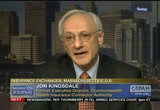tv Washington This Week CSPAN November 24, 2013 5:00pm-6:01pm EST
5:00 pm
happened in bond does not change this. >> let me just make one comment on one of your observations, with reference to the human rights committee, which attempted to expand the scope of its authority. the united states successfully pushed back. and we made it clear before, the committee does not have the authority under any entity, including the u.s. congress -- i know there is a concern about binding future congresses. a future congress can go ahead and amend the american disabilities act. it has once. is a greatee there desire to change the president's health care law. just one of 100 examples i could give. there's a lot of things that to a number ofdo
5:01 pm
hypothetically bizarre things. they could seek to ultimately sell the capital for scrap or disband -- the expressions of approval or disapproval are not in order of the committee. i'm trying to get to a point here. and despite faith, our challenges sometimes in the institution and american people, who would say, that is way off the face. in suggesting that whatever language is necessary, i don't think this congress itss to be bound itself in actions by what the previous congress decided as is evidenced by those who wanted to undermine the president's health care law. i present congress wants to change what a previous congress did.
5:02 pm
i think that only a congress might be able to change a future rut or changes in the american with disabilities act. it would have to be signed by a president. just creating some balance in that is a reality of any future issue is realistic. >> i largely agree with what you said. if congress decided to amend the ada, it could consider doing that. we would need to recall that congress used its regular commerce clause to enact the ada, and i'm suggesting it should return to those powers if it wanted to amend the ada. take offuggesting to the table is the claim that congress might try to expand its authority beyond the broad .ommerce clause that's the only issue i'm talking about, not the ability of congress to legislate. >> that would be a concern
5:03 pm
beyond the question of this treaty. says, if you and have a treaty, congress can wrap clauseority beyond the -- you don't have that concern? >> the commerce clause would be held outside of the treaty context. -- thestices said solicitor general said, congress would not do anything crazy like invade the prerogative of the state. then why do i see this prosecution here of a local poisoning case? let's just take them off the table. >> except that let's be clear. basis under, the which federal action took place, in this case the justice department, was under and enacting statute. it has been clearly stated here time and time again by all the relevant parties that what is
5:04 pm
the americans with disabilities act is our enacting statute. to the extent that the government would have to prosecute, it would have to prosecute under the ada. whatever he has prosecuted, it has already prosecuted. >> as you point out, it could be amended. >> anything we do here can be amended. absurd to think that somehow we're not going to ever allow a future congress to change anything that a previous congress would do. as america's change majorities, they do it for reason. they want to see a different course of action. quite sure that can be foolproof. i get your concerns. >> thank you, mr. chairman. i know that someone raised the change before we act. i want to make sure people
5:05 pm
understand i'm not that person. >> you always had a more considered view. >> thank you. of our members have not been here to read -- today. some of them would like to have until monday afternoon to ask questions, if that's ok for the record. >> without objection. i know that you yourself are a legal scholar, and these gentlemen are. i think the point he's trying to make on this issue is not that a future congress cannot change laws. we all understand that. the treaty possibility to affect the commerce clause changes norms thaty the congress acts under. that is a point that was missed, and as you all talk past each conversation last -- i hope it is something we are able to resolve.
5:06 pm
i'm going to walk through a very bland set of questions, and i apologize. we are trying to work through all the legalities here. i know your testimony spoke to some of these things. i want to walk through these in order to build a record so if something happens down the road, we have that here. can you describe how the cee rpd might alter the constitutional balance of power between federal and state reference -- governments? >> as indicated in my writing testimony, treaties address some matters that have a to state and toal regulation -- been left state and local regulation. it is written to accommodate more than 100 legal systems and does not focus on u.s. law. childrenses care of and family law that are primarily under state and local law.
5:07 pm
it is not distinguish between housing, private housing decisions, and public accommodations. u.s. law often makes those distinctions in part because of limits on the federal government's authority to regulate private decisions or things that are quite local. maybe the bond case will or will not change this picture. senator, for clarifying my exchange i had before. the issue is not whether congress could change the laws. it could always use its regular powers to do that. we have case law that says if there is a treaty, congress does not need to worry about any of its normal limitations on its legislative authority. underis nothing to local this old case. once you have a treaty in place, you can regulate local housing divisions in a way congress could never do. without protection here, there's at least a danger. that the convention
5:08 pm
could be used in that sort of way. there's a danger they could be fully addressed by the appropriate reservation. it's important that we do that. sufficientproposals to address these concerns, and if not, how would you modify those ruts? the proposed understandings, declarations, reservations are not sufficient. >> can i ask the ranking member -- are you referring to the previous reds -- ruds? the ones --ring to >> they were never adopted. they are not sufficient. the federalism in private ruds say theng convention is not requiring that we take over some private decision, not in any way stop congress from using this
5:09 pm
missouri against holland i get to expand congress's authority -- to spend congress's authority. that's not going to happen. that needs to be fixed. other things, such as the understanding on the committee, does not refer to the problem that they might try to strike down our reservations, which some committees have tried to do before. out,nator menendez pointed you push back on that. the u.n. has come out against the u.s. position that if a monitoring body finds reservations are no good, we assume the country is still bound without the benefits of those. we may push back on those as well, but it argues for clarifying this in the ruds. >> the fact the supreme court recently heard a case whether treaties made expand congress raised concerns about
5:10 pm
federalism. case highlights some of the concerns that get raised when you have a treaty and then implementing legislation. senator menendez is correct that we don't get had that because we have earlier legislation. the issue people are afraid about is what if we have new legislation? in the bond case, a lot of people were surprised that the treaty power that was supposed to deal with syria is now being crimes within a state. the justices on the supreme court were surprised. i would not be shocked if the senate were surprised if that was what they agreed to. you may find down the line that congress or the executive branch applies them in ways that the senate never intended. that's another argument for ruds , is to prevent that going down the line. >> i know many of these
5:11 pm
questions have been answered in other ways, and i want to have these for the record today. is it possible that the ruds adopted by the senate could be overridden in the future, for instance, reservation against expanded federal power? how would you recommend to ensure that the ruds we adopt are protected? we don't have examples of where congress or the executives have tried to go back on the ruds. i hope that would be unlikely, since the condition of the senate's advise against him, this would be included in the resolution advice. if we were worried about it, i talk about in my written testimony that he could be made very clear in the ruds that these are non-severable, and the way to withdraw them -- i think secretary kerry was asked about them this morning -- would be to go back to the senate. i was understanding the senate to be receptive the one would need to go back to the senate to go back to the reds.
5:12 pm
>> figuring much. >> -- thank you very much. crpdan you describe the with respect to sovereignty, specific concerns? >> i understand the meaning of a treaty as we promised another -- to have to be some basic limits about what we can promise. aspectot have have every of policy up for grabs, handed up to some international into dr process. i cannot think of a treaty that is at all analogous to the crpd. it covers a whole range of things about how american
5:13 pm
government or american private entities treat other americans, and we say we are promising the world that were going to do this the way the world thinks it should be done. when wecrossed a bridge start making those kinds of promises. in relation to the discussion you have been having with bradley here -- the danger of some court not the will say, we are overriding it. this is totally foreseeable. the monitoring committee and other countries will say, you promised. you have got to live up to your promise, in you cannot say, we had our fingers crossed behind our back. i think we will experience moral and political pressure to abandon the ruds and it will be anyone tos anyone -- say there was a reservation.
5:14 pm
if we think we have leverage on other countries, we should expect they have leverage on us. you may have answered my follow-up to that, but to you think the issues you have raised can be fully addressed through ?he ruds do you think the legal points -- >> there are two different issues here. one is, can we anticipate every possible difficulty and provide andin advance with a rud, maybe if we are imaginative and work hard. even then, there's the question, what is it me to ratify a treaty when you say, we have 28 or 32 exceptions we are taking, but otherwise we are really part of it? sayingave enough rud's we are part of it, we are -- why
5:15 pm
are we pertaining to be part of it? it is a monitoring committee, the committee of experts says no, that is not a valid rud, do we have the self-confidence to say, we don't care what you said, we are america, we're doing what we want to do. do we have the confidence to speak that way? i was uncomfortable. i'm at least as nationalist as senator kerry. i thought it was very awkward that he said, we don't have to do a thing. think you can in good faith enter into a treaty and then say to the world, you can't complain, we're not doing anything. we routinely have disputes in the wto. it does not change our law. non the body of the wto says , we do change our law. i don't think we would find it so easy to just shrug off
5:16 pm
international criticism, particularly when it comes from the official committee set up to decide whether we are in compliance. we mayof those rud's find ourselves down the road saying, we're not supposed to do that, we will change our law, that is what bothers people. >> thank you for your testimony. mr. chairman, thank you for having this hearing. >> thank you, senator corker. i have a couple of questions. the main focus of the reason for this treaty is obviously to extend from my perspective the rights for 58 million americans, five and a half million veterans , to find it more likely than not that they will travel someplace in the world for business or education, for pleasure, and more likely than havingd themselves standards of accessibility as we enjoy the united states, which
5:17 pm
is the world's leader in this .egard that is the compelling reality. foryour testimony -- example, the technologies -- this is not, as a professor said, and american business. think aboutng we has pretty much an economic dimension to it. this nothing wrong with looking at american leadership to the private sector in creating in the world standards that will have the citizens of those countries enjoy higher standards for their own accessibility as well as ours. our technologies that provide access to people with disabilities, is it a small niche market or a large business opportunity? >> it is a huge market, and it is just at a beginning of a growing market.
5:18 pm
in the past few years, with proliferation of smartphone devices, putting accessibility in the center. sometimes people think of it is just as people -- for people with disabilities. a cell phone really brings to play that everyone of us can be situationally disabled. you could be driving the car but you still want to read your e- mail. you need some technology that can read the e-mail through speech. we see that accessibility is becoming what we call the human centric technology. you can think about the aging population in the u.s. , babye 6 million people boomers. in china, they will have 365 million people over the age of 65 in the middle of the century. , they naturally
5:19 pm
will acquire disabilities. the market is just at the beginning of growth. this is one of those areas that we really, truly believe that you can do good while you do well. i have seen that play out in ibm's history in the past 100 years, and we just think that the crpd really gives a foreign and gives another -- forum and gives another opportunity for all the businesses to partake in this. >> you also talked about the importance of harmonize nation of international standards when it comes to furthering the interests of the u.s. in the global market for accessible products. there has been some testimony here about entanglement in remote international deliberations. in so many different sectors very active in
5:20 pm
international bodies that are promoting standards so that we can try to generate closer and closer to american standards that will open the opportunity for our people as well as our business to be globally competitive? >> yes. the standard is very important, not just for technology but for electronic daily areas. especiallystandards, based on american standards, is definitely a preferred position for the u.s. companies because they help to ensure that we have leadership position, reduces the cases,nd in many especially in a disability area, it really gives us that extra moral benefit because technology in this case does help people
5:21 pm
with disabilities to better their lives and their employment opportunities. ofis really a great example as it bringsvation benefit to the entire world in general. >> thank you. i'm glad we have that perspective. let me close with some final observations. professor, you seem to be missing a major point of secretary kerry's testimony. you stated several times that what the secretary said, the u.s. does not have any obligations under the treaty. he did not say that. what he has testified to is that we have already met our obligations under the treaty, so we need to take no additional action to comply. i think that's a very significant difference than to say there are no obligations whatsoever.
5:22 pm
we have taken those obligations. theme just say that administration, today and at other times, has repeatedly stated before this committee that all legislation necessary to implement the treaty are already existing. the conversation that we have had about what the rud's look like are important both to amplify that and to make sure that there is no views that would undermine that reality. treatycern that the could suddenly declare itself simply doesof rud's not hold water in the context of some of our history here. beenver 20 years, we have a party to the international covenant on civil and political , which created the human
5:23 pm
rights committee. we have ratified the treaty with a number of rud's, many of which were similar to those who were seeking to include for the disabilities treaty. valid, oathmain internationally as well as domestically. time and again, our courts, including the supreme court, have affirmed the validity of our rud's. it's important as members to read this testimony. finally, i have a statement from , and i askhin seki unanimous consent that he be entered into the record. into theentered
5:24 pm
record. there may be some follow-up questions. we will keep the record open until the close of business on monday for members to submit any questions they have. thank you for your individual expertise and insights. this committee stands adjourned. [captioning performed by the national captioning institute] [captions copyright national cable satellite corp. 2013]
5:26 pm
>> tomorrow on c-span, u.s. nuclear weapons policy from the cato institute and the cost of maintaining a nuclear arsenal. let coverage begins at noon eastern. president obama's plans for immigration, live from san francisco, at 2:35 eastern. i thought it was fun to have a little view of history of a time in america that wasn't in
quote
5:27 pm
structural, first and foremost, that was a little bit more a little bit more archaeological, meaning random. you take a look at them and see bunches of weird photos, and then the captions explain them. i had a vision of high school students flipping through them and loving history if they flipped through it. pan.mc networks had josh sa "q&a." picture on c-span >> during the president's , heoric trip to china noticed how mrs.
5:28 pm
he said, we will make sure that you have pandas to go home with. just her being there would bring so much goodwill. the news reports would come out. they would talk about the president, but they would always say what a wonderful job that panics and did. >> -- pat nixon did. 9:00.day night live at from boston is john king stale former executive director of the massachusetts health insurance connector authority. thank you for
5:29 pm
folks who do not have insurance, low and moderate income. insurers 250,000 people. >> more immediately, the looming deadline, this saturday, the white house a department of health and human serious is -- services insisting that healthcare.gov will be operational. what is your confidence level it will be working? >> they are making steady progress, and would expect come the end of november, it will be better than it is today. it won't be perfect. this is going to be a work in progress for some months to come to get a completely up to snuff, and then for years, to continue to improve it. we did that in massachusetts. >> you have been quoted as saying it is more than just a
5:30 pm
website problem. explain. it is an entire reform, particularly for the small group insurance markets, that have not functioned very well in this country. the fact we have over 50 million uninsured, and climbing, until this year. entire set of reforms. there are subsidies involved, market rules, all sorts of elements to this to make the insurance markets work for my for the uninsured, and lower income folks as well as for healthy middle-class people. host: did you consult with hhs on what worked, what did not work in massachusetts, and how to apply that federally? guest: i have been peripherally involved in this since 2008, when the finance committee held a joint sponsored all-day session in june of 2008 in
5:31 pm
washington to set the agenda. and you said the concepts for health care reform in the united states. i remember him saying how much agreement there was. this is really what this reform has been. that is what this reform has been since we did it first in massachusetts. that is a real live american example. we were consulted and i was consulted as the legislation shaped up from time to time. not closely involved. i do not want to overstate that. host: kathleen sebelius has taken responsibility. she has said she is to blame for this. who else is responsible? what could the government has done differently? guest: i do not know who had their fingerprints all over this and who did not.
5:32 pm
the fundamental mistake was not doing what a number of mistakes, including massachusetts, have done. there are 2 sets of initiatives required to implement reform. one is a whole set of regulations, which i think hhs has done a reasonably good job of doing under pressure. the other element is to create a new marketplace. a commercial enterprise for which the traditional agencies are not well-suited. a number of the states that have done exchanges have set up semi- independent agencies with a board of directors appointed by the governor and others.
5:33 pm
like the sec or the fcc. they were able to develop a new function for government rather than lodge it in and existing agency. host: do they permit medical underwriting? in massachusetts? host: it is important with the aca and the rest of the country. we had a series of reforms that led up to our landmark legislation in 2006. we outlawed medical underwriting in the 1990's and gradually moved toward universal coverage and the requirements with -- for individuals to participate. host: a tweet from another viewer.
5:34 pm
what are some of the key issues that must be addressed to take the health-care program from a state to the national level. explain. isst: one of the key issues reflecting what differences each state has. insurance markets are heavily regulated. they have been for many decades. they are regulated -- they have been for many decades. they are regulated at the state level. the senate version -- the house version was going to have a national exchange and the senate version was state-by-state reform. that was a wise approach. unfortunately, so many states have refused to take up the responsibility or the opportunity to run their own reform because of this republican-democrat divide over the basic idea that we should have universal coverage.
5:35 pm
at the most fundamental level, there seems to be a unified opposition to the aca without any particular interest in covering the uninsured. so many red states not only will not do their own exchange despite preferences for state control, but they will not expand medicaid to cover the uninsured. -- the uninsured below 130% of poverty. it suggests to me that it is not an interest in covering the uninsured. that is 50 million people in this country. that is the size of most country -- countries. host: jon kingsdale is joining us to talk about his experiences in implementing the counterpart to the affordable care act in massachusetts. do folks still refer to it as
5:36 pm
romney care? guest: they never really did call it romney care here. i first heard that term last year. that is a washington invention, if you will. maybe it comes out of the election of 2012 and the campaign rhetoric. we generally refer to it as the lovely brand, chapter 58. host: john is joining us. caller: i am happy to have mr. kingsdale. i would suggest it might be good for c-span2 invite the architects of the brave sick framework ofbasic the affordable care act and how it will be helpful. a conservative organization known as the heritage organization and the public in politicians who supported it basically came out after hillary was assigned by her husband,
5:37 pm
president clinton, to have a panel to design a universal health care plan. they came up with a plan that massachusetts used as a model. the heritage foundation and senator grassley and all of the republican politicians should come on and explain the details of how it will be beneficial. host: thanks for the call. the first memo from the heritage foundation dates back to 1989. people say that was the framework for what the president implemented as the affordable care act. guest: the heritage foundation has moved considerably to the right since those times. i do not see any strong, credible plan from that wing of the political spectrum for covering our 50 million uninsured in our country. the concept is market driven.
5:38 pm
it was and is to correct what is the least well functioning and dysfunctional market segment, which is the small, non-group insurance. we have large employer groups providing group insurance coverage for a couple of reasons. having that subsidy from employers is critically important. in the affordable care act, the basic concept was, everybody has to have insurance. that helps spread the cost of insurance from just the sick and the healthy. those who cannot afford it and do not have employer subsidy should get public subsidies. the market itself has be fair and work effectively for the sick as well as the healthy.
5:39 pm
that is how we got 2% to 3%. the healthy and the well-off pay more for their insurance just as most folks will pay less. there are some decisions and -- or rescissions or cancellations. in our old system, there were cancellations every year. when we get over that hump, this will be better for the vast majority of americans. host: jon kingsdale has spent most of his career doing with health care issues. he began his career as a reporter for forbes magazine and spent many years working for blue cross blue shield.
5:40 pm
he is the manager at a consulting group. this from john in carolina. why were rates in massachusetts much higher than most states prior to romney care? guest: we have two separate -- sets of rates. one is for group coverage. that reflects our typically higher costs for medical care than the average in the country. our administrative costs are in line or somewhat lower than the rest of the country for administering insurance. most of the dollars, about 90%, go to doctors and hospitals for medical care itself, which is a high ratio. a good sign of efficiency. the cost of hospitalization here, the cost of some of these medical services has been
5:41 pm
traditionally higher than in the rest of the country for a number of reasons that have nothing to do with health reform. part of our insurance market that was broken was the individual direct purchase market. that had high rates, which actually came down 25% with the implementation of health reform in 2007. that did not reflect high medical costs in massachusetts as much as a broken insurance market for individuals. host: let me talk about the health care market. this is from "time" magazine, which as an in depth look at the affordable care act. john gruber saying that over the last 15-20 years, there has been a decline in employer sponsored benefits. this chart shows that about 49% of americans get their health
5:42 pm
insurance. that adds up to 150 million americans. 16% with no insurance and about 1% getting it from the military. 13% through medicare. 16% through medicaid. if we were to look at this same chart in five years, what would it look like? guest: you would see a substantial increase in the percentage of the population getting their insurance through medicaid and in the individual market, assuming the transition to the individual market takes place. you may see a smaller percentage of individuals getting their insurance through employers. we will have to see. that did not happen in massachusetts. that is a function of the labor market. the labor markets in different parts of the country are different.
5:43 pm
we may see some reductions. -- reductions in employer- sponsored insurance as we see the increase of medicaid. with the aging of the population, a slow and steady uptick in medicare coverage. as a result of this transformation, a big increase. -- increase in the individual market. 15 million people buy insurance directly on their own. it will be 40 million people five years from now. host: do you agree or disagree with this quote? think of the employer system as a crumbling building. is it that? guest: i do not think i would quite agree. he is still on the board of the connector and we are good friends. i have tremendous respect for him. crumbling is an overstatement. there are cracks in the foundation.
5:44 pm
one of the trends is not only the move toward the individual purchase of coverage or exchanges, but employers are outsourcing the whole benefits idea, the whole purchase of insurance, to private exchanges. we are seeing private exchanges take off. that is part of this general movement toward direct lurches of insurance. , andrchase of insurance away from employer-sponsored insurance. employers are finding that they are not good at picking insurance for employees. the heritage foundation, a good old-fashioned republican principle, consumers are exercising more direct control and choice in the market for their own coverage. host: bill makes this point. if subscribing to the massachusetts law also great for health care, why did they pass a law forcing citizens to sign up?
5:45 pm
guest: that is a great question and it goes to the overall architecture to make the insurance market work effectively. if you just leave it to an individual to decide whether or not to buy insurance with his or her own dollars, there is a strong tendency for the individual to wait until they get sick and then buy the insurance. the effect of that is that the insurance companies have to either deny coverage or they have to rate the premiums so high that most people cannot afford it. the principle here is just like group coverage, to get everyone into the insurance pool, the healthy as well as the sick. and to provide subsidies for lower income folks.
5:46 pm
that is why there is this requirement. there are a number of outs for people who have a religious rejection or cannot afford it. the policy is fairly modest. there is a requirement to participate in the insurance while you are healthy and not wait until you get sick. it is like not allowing people to buy homeowners insurance when their house is on fire. host: our guest earned his risk from the university of michigan. he is the founding director of the massachusetts health exchange. can the lessons learned to be applied to the federal government? earl is in iowa on the independent line. caller: good morning. why didn't the federal government go in and run it from each state? guest: that is a great question.
5:47 pm
everybody at health and human services and the white house expected most states to run their own exchanges. there is very generous subsidies from washington to 17 states that are running their own exchange. the enactors thought that there would only be a few states not running their own exchange. there was staunch political opposition to the entire affordable care act. some states have not stepped to the line and done their own exchange. host: you can join the conversation on facebook at any time. you can also send us a tweet or an e-mail. lillian is joining us from
5:48 pm
massachusetts. what is your sense of the health-care law in your state? caller: am i on? host: you sure are. caller: i have been in massachusetts since the mid-70s. i was on a small business plan in 1982, paying $42. it was a pto. -- ppl. -- ppo. i was an independent freelance writer. i could always afford very good coverage, even when i struggled. the last 15 years i have been on my own small business plan, and costs me $1020 a month. i still have the doctors i want. i still have the facilities i want. i think it is working in massachusetts. i have 2 quick questions i have to ask.
5:49 pm
comparing massachusetts and what we can learn from our experience and the nation. my perception, and i was not paying close attention over the decades in massachusetts -- i never had to give up my doctor and i never had to give up my facilities. i was paying my way and i kept paying, but i paid more. what is the difference? why are we having this problem nationally? 10 years ago i called my senator and i said what is with this? my individual policy, which is a $1000 deductible and a 20% co- pay, was going to be a cadillac tax. it would be taxed at 40%. i was very concerned.
5:50 pm
the gentleman said it was passed by the legislators who were trying to stop the goldman sachses of the world from giving nontaxable benefits to their employees. they did not know that the middle class would be caught in this. guest: i think her experience is pretty typical for people in massachusetts. this law remains popular. there was considerably less disruption than we hear about nationally because massachusetts started their reforms over a period of years. we did a lot of reforms in the 1990's. as a result, we had less underinsurance and less outlawed medical underwriting.
5:51 pm
that is the denial of coverage for people when they get sick. that experience is not so different from what we are going to see and experience nationally. the big disruption has been folks in 36 states have trouble getting on the federal website to see what their options are. there are lots of options. we looked at the first 10 or 11 states that did their own exchange for 2014. we see a 35% increase in the number of health insurance companies offering plans in the individual market. we are going to see robust competition here in massachusetts. we are at 10 separate health insurance companies. from six, about seven years ago, that are competing for individual business and a very robust market. the difference that lillian is
5:52 pm
pointing to is partly that all of this transition we did over a decade is wrapped into a one- year, 2014 transition. it is not as much disruption as most people are experiencing. for example, cancellations. they affect 5 million people. for the vast majority of americans, there is no transition. we have perception by anecdote rather than quantification. host: a piece in forbes magazine. one of your early employers. healthcare.gov crashes during the first day. you can read details online at forbes.com. i want to share a tweet from marie.
5:53 pm
i have a feeling governor romney was very involved in romney care. president obama is detached from obamacare sadly. do you agree or disagree with that sentiment? guest: i would disagree. i met governor romney when i was hired for this position. he did an interview with me. i am not saying he was on involved. -- uninvolved. if you recall, this was passed in april 2006. he was already very involved with the national campaign for the republican nomination for 2008 that was ultimately unsuccessful. it was really -- campaign for the republican nomination of 2008 and was ultimately unsuccessful. governor deval patrick has been very involved and very supportive as well.
5:54 pm
while the white house seems to have focused elsewhere on many other important issues and 2011, 2012, they were involved in the passing and implementation of health care. host: rich is joining us on the republican line from florida. caller: i went to the website yesterday and had no problem signing up for health insurance. what people do not realize is the fact that when they see the $6,000 co-pay -- i am relatively healthy. doctors appointments and basic checkups are just a co-pay. it is nice to know that if i did have to go to the hospital, my maximum amount of payment would be $6,000. i took a company buyout from my employer. the insurance they were offering was too expensive for me.
5:55 pm
if you look at the options and give it time, a lot of the problems are people making errors on their end. i called the website navigator and she helped me through it. there is a lot of misinformation out there. it is a great deal and it is very affordable for me. host: rich, thanks for the call. from virginia on the democrats' line. caller: thank god for c-span. i am a west virginia conservative democrat. i think the gentleman is wrong about mr. romney not being involved. he was involved in all of the massachusetts insurance. the big thing with the government insurance plan is they did everything behind
5:56 pm
closed doors. they did not do what massachusetts did. they sat down with both parties and put everything on the table and ironed out everything and picked out the best things that would be good for the people of massachusetts. this president did not do this. mrs. pelosi, harry reid, they did everything behind closed doors and they pushed this thing through because they had the house. they passed it without even a republican voting for it or putting a recommendation on the table for it. this thing is going to self- destruct because they are not going to get the 7 million young people to sign up for this thing to keep it going. host: george, thanks for the call.
5:57 pm
2 interesting calls , one from a republican supporting the affordable care act. guest: some people are going to experience immediate benefits and some will have to pay more for coverage. if they were young and healthy, they were one of the beneficiaries. they will see advantages and disadvantages. on the politics, let me be clear. the romney administration did an excellent job here in massachusetts beginning the implementation of health reform in 2006 in the waning year of their administration. the gentleman from west virginia is absolutely right. governor romney's aides were involved. the chair of the board of the exchange was the secretary of administration finance. the secretary of health and
5:58 pm
human services was extremely involved. i did not mean to suggest his administration was absent. it was a transparent, open process by and large. there was an effort to do the same thing in washington. you will remember there were months and months of negotiation and the senate finance committee between the so-called gang of 6 over the summer of 2009. they could not get anywhere. no matter how market oriented and conservative the democrats were willing to be -- and they were much more so in that committee -- the republicans did not sign on. we got into the august 2009 break and the town hall meetings and the robust opposition from the far right and republicans backed off. there was not much choice for the democrats.
5:59 pm
host: the official title of what some in washington have been calling romney care was an act of providing access to affordable, quality, accountable health care. it was signed into law by governor romney in 2006. is your former office still in existence in massachusetts? guest: it is indeed. we still have a board of 11. it still enjoys bipartisan support. former u.s. senator scott brown, when he was a state legislator, voted for health reform, as did most republicans. that is definitely a difference. it is a huge difference, arguably, to do something this big without bipartisan support made to the climb uphill so much more difficult. >
6:00 pm
c-span, newsmakers with representative thornberry,. , rand paul at the citadel military academy in south carolina. joining us at "newsmakers" >> joining us on newsmakers is the republican from texas, he is the vice chair of the house armed services committee, also a member of the house intelligence committee. thank you for joining us. here with the questioning today, jim michaels who covers military issues, and sarah. i want to begin with you. the comments last week by secretary chuck hagel meeting with members of congress to end sequestration and work out an agreement on the budget. when lawmakers return after the thanks giving recess, will that happen? >> i am not sure, but i am fairly optimistic.
72 Views
IN COLLECTIONS
CSPAN Television Archive
Television Archive  Television Archive News Search Service
Television Archive News Search Service 
Uploaded by TV Archive on

 Live Music Archive
Live Music Archive Librivox Free Audio
Librivox Free Audio Metropolitan Museum
Metropolitan Museum Cleveland Museum of Art
Cleveland Museum of Art Internet Arcade
Internet Arcade Console Living Room
Console Living Room Books to Borrow
Books to Borrow Open Library
Open Library TV News
TV News Understanding 9/11
Understanding 9/11